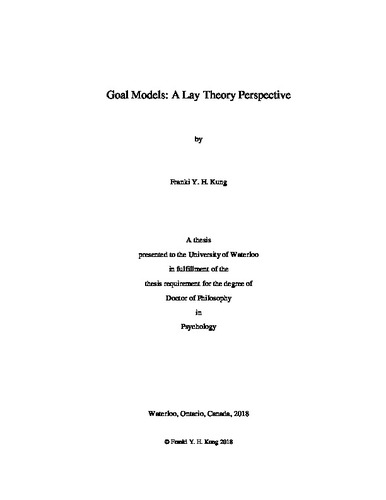| dc.description.abstract | Successful pursuit of multiple goals (e.g., health, career, family goals) is critical to personal well-being and social prosperity. However, despite significant research on how people manage single goals or even dynamics among two goals, people’s understanding of the relations among all of their goals (i.e., goal structure) has not been extensively researched. To address this gap, this dissertation builds on the rich traditions in social science that study differences in people’s lay theories about the nature of things and how they work. Synthesizing diverse scientific theories of goal structures (e.g., control theory, spreading activation theory), I proposed a novel framework to study lay theories of goal structure, or goal models (i.e., individuals’ beliefs about the organizing principles of the relations among goals): hierarchical, network, and sequential. To study goal models, I borrowed mind-mapping techniques and developed methods to assess and manipulate individuals’ goal models. Results of the validation study (Study 1) provided initial evidence that there is diversity in how people represent their goals, and that this diversity is well-captured by the goal model framework. Since these goal models highlight different organizing principles, I argue that they can confer benefits or involve costs, depending on the situation. Subsequent studies (Studies 2 to 7) tested the corresponding implications of goal models across self-regulatory situations (e.g., managing chronic goal conflict, goal progress) and presented evidence for the predictive validity of each model. This research contributes to the extant literature (on goals, self-regulation, lay theories, etc.) by providing a theoretical framework and scientific methods to systematically understand the nature and impact of the way individuals structure their goals. The findings on divergent implications of goal models offer practical insights into the dynamics of regulating multiple goals, helping to promote effective self-regulation. | en |

